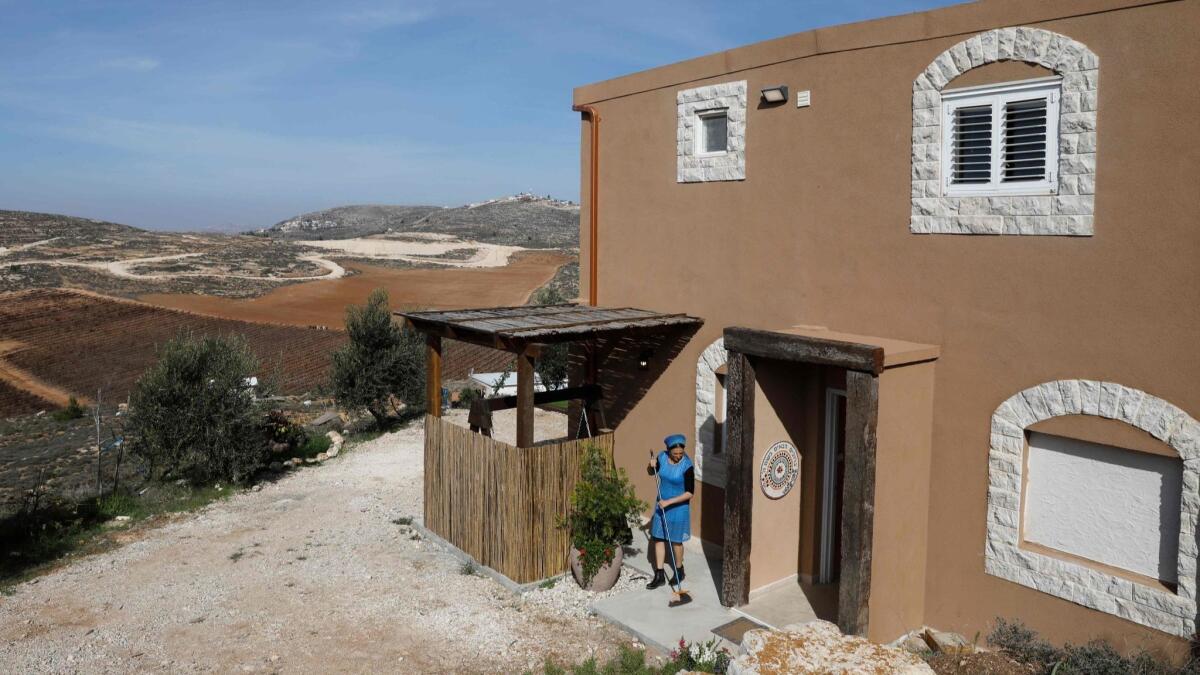Israel reacts with anger to Airbnb removing rental listings in West Bank settlements

Reporting from Jerusalem — Israel has reacted with anger to Airbnb’s announcement that it will drop rental listings in Israeli settlements in the occupied West Bank.
The decision announced Monday by the San Francisco-based home-sharing platform is expected to affect about 200 rental units. It is viewed as a significant symbolic victory for the Boycott, Divestment and Sanctions movement aimed at pressuring Israel on its treatment of Palestinians. Israel, which has pushed back against the BDS movement, responded by calling for lawsuits and plans to disrupt Airbnb’s business.
Israeli Tourism Minister Yariv Levin said the “miserable decision” was a “disgraceful surrender by the company” and ordered his office to develop measures to hinder Airbnb’s activity in the country.
The boycott movement seeks to pressure Israel to, among other things, end its military occupation of the West Bank and East Jerusalem, territories captured in the 1967 Middle East War.
Israel has not annexed the West Bank, and its settlements in the contested land that Palestinians claim for their state are considered illegal under international law.
But Gilad Erdan, the Israeli government’s point person for fighting the boycott movement, said in a radio interview that “there is no distinction between this part or that part of the state of Israel.”
He compared his ministry’s efforts to that of the “Israeli army, that continuously attacks terrorist organizations, even though there are occasional attacks.” He called on property owners to sue Airbnb using Israel’s Law for Prevention of Damage to the State of Israel Through Boycott.
Airbnb appeared wary of stepping into the heated international melee, acknowledging in its statement that “we are most certainly not the experts when it comes to the historical disputes in this region” and noting that its team “wrestled with this issue.”
Airbnb said that U.S. law allows it to host listings for the properties. However, it concluded after a review that it should remove listings in the West Bank settlements “that are at the core of the dispute between Israelis and Palestinians.”
David Rosenberg, a columnist for the liberal Israeli daily Haaretz, noted that the “big win for BDS … won’t even scratch the Israeli economy, or even that of the settlements, but it did drive the government into hysterics.”
Palestinian leaders did not express corresponding levels of praise for the policy so harshly condemned by Israel.
Saeb Erekat, a top official in the Palestinian Authority, said in a statement that “it would have been crucial for Airbnb to follow the position of international law that Israel is the occupying power and that Israeli settlements in the West Bank, including occupied East Jerusalem, are illegal and constitute war crimes.”
Groups that have long championed a boycott of Israeli settlements applauded the move.
The Palestinian BDS National Committee lauded the company for “a first step in the right direction to end Airbnb’s profiting from Israel’s theft of indigenous Palestinians’ lands and natural resources.”
In a 65-page report published Tuesday, the international advocacy group Human Rights Watch said that “by delisting rentals in illegal settlements off-limits to Palestinians, Airbnb has taken a stand against discrimination, displacement and land theft.”
Arvind Ganesan, the watchdog group’s business and human rights director, said that “the continued business activities of Booking.com and other companies in settlements contribute to entrenching a two-tiered discriminatory regime in the West Bank,” in which Palestinians do not have access to Israeli settlements.
Airbnb’s move is “a step in the right direction,” Omar Barghouti, a founding member of the BDS movement, told The Times. But he said the action was insufficient because Airbnb is not removing property listings in East Jerusalem and in the contested Old City of Jerusalem.
“Companies that are complicit in Israel’s egregious human rights violations must end their complicity and involvement — and involvement with settlements in particular is a major form of complicity, because Israeli settlements in the occupied Palestinian territory including East Jerusalem are considered a war crime under the Fourth Geneva Convention.”
The boycott movement’s aim to affect Israel’s economy and policies remains a steep challenge.
On the same day Airbnb posted its statement, the Jerusalem-based image-editing tech company Lightricks announced it raised $60 million in a financing round led by the New York venture capital firm Insight Venture Partners.
The economic impact of the boycott movement is “not very considerable yet,” Barghouti allowed, but “the far-right government in Israel and the BDS movement seem to agree” that it will grow.
He pointed to “a whole [Israeli] industry dedicated to fighting BDS,” capped by Erdan’s Ministry of Strategic Affairs and Public Diplomacy.
“When a company decides to end its complicity in Israeli settlements, this far-right government goes absolutely crazy because they’ve gotten used to lack of accountability, total impunity, with the massive support from the far-right in the U.S.,” Barghouti said.
On the other side, pro-Israel voices decried what they described as open corporate anti-Semitism.
“This is not about disputed territories, as Airbnb has listings in Moroccan-occupied Western Sahara, Turkish-occupied Cyprus, and more,” Eugene Kontorovich, a George Mason University professor of law, said in a statement.
“So it is only Jewish properties in the Jewish homeland that are banned. Airbnb’s approach of singling out Jews from all the disputes in the world will put it at odds with U.S. state BDS laws and principles of discrimination.”
Airbnb offered a muted response to critics’ accusations.
“Israel is a special place, and our over 22,000 hosts are special people who have welcomed hundreds of thousands of guests to Israel,” said Chris Lehane, head of global policy and communications at Airbnb. “We understand that this is a hard and complicated issue, and we appreciate everyone’s perspective.”
Tarnopolsky is a special correspondent. Times staff writer Hugo Martin in Los Angeles contributed to this report.
More to Read
Sign up for Essential California
The most important California stories and recommendations in your inbox every morning.
You may occasionally receive promotional content from the Los Angeles Times.










